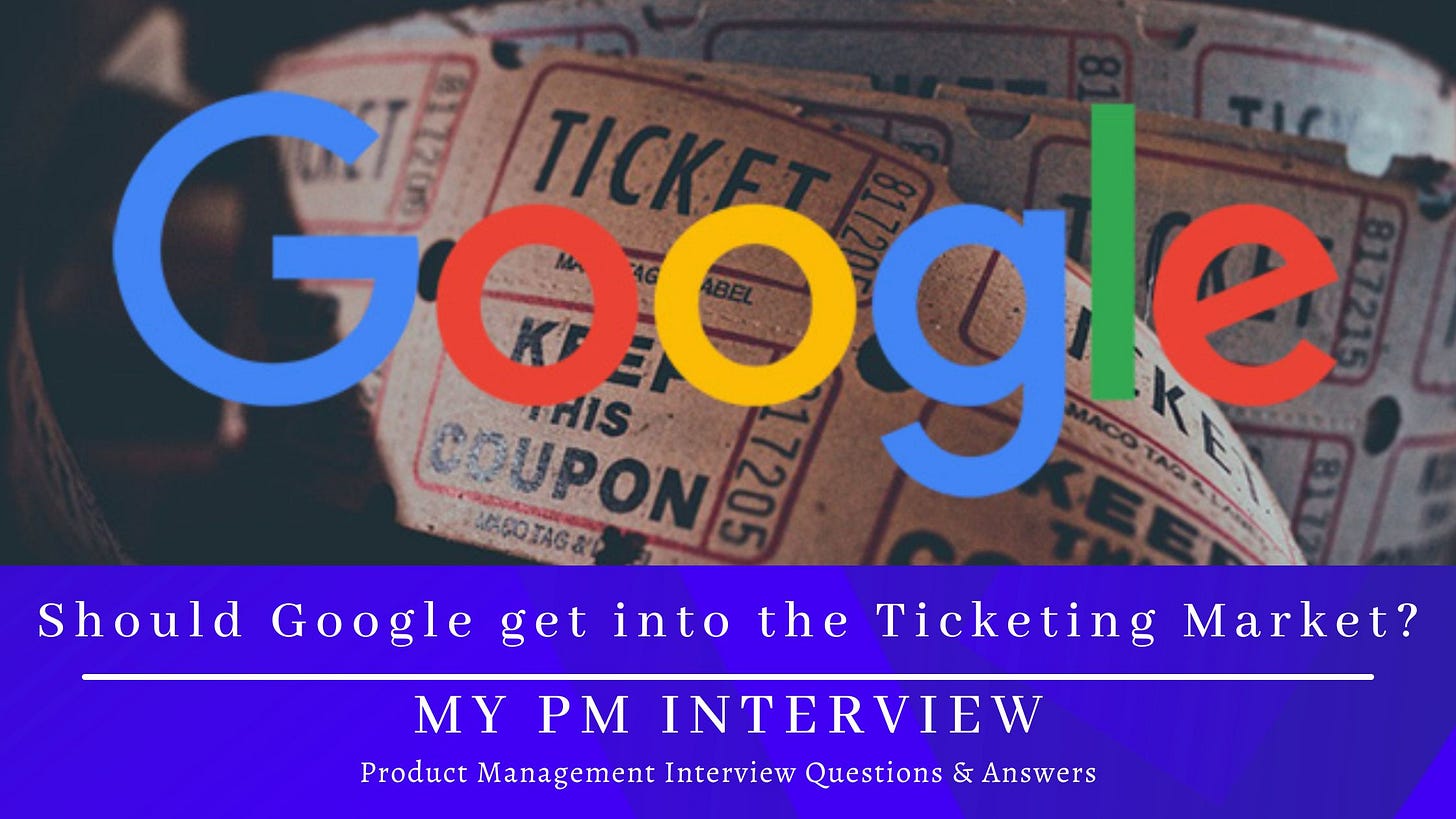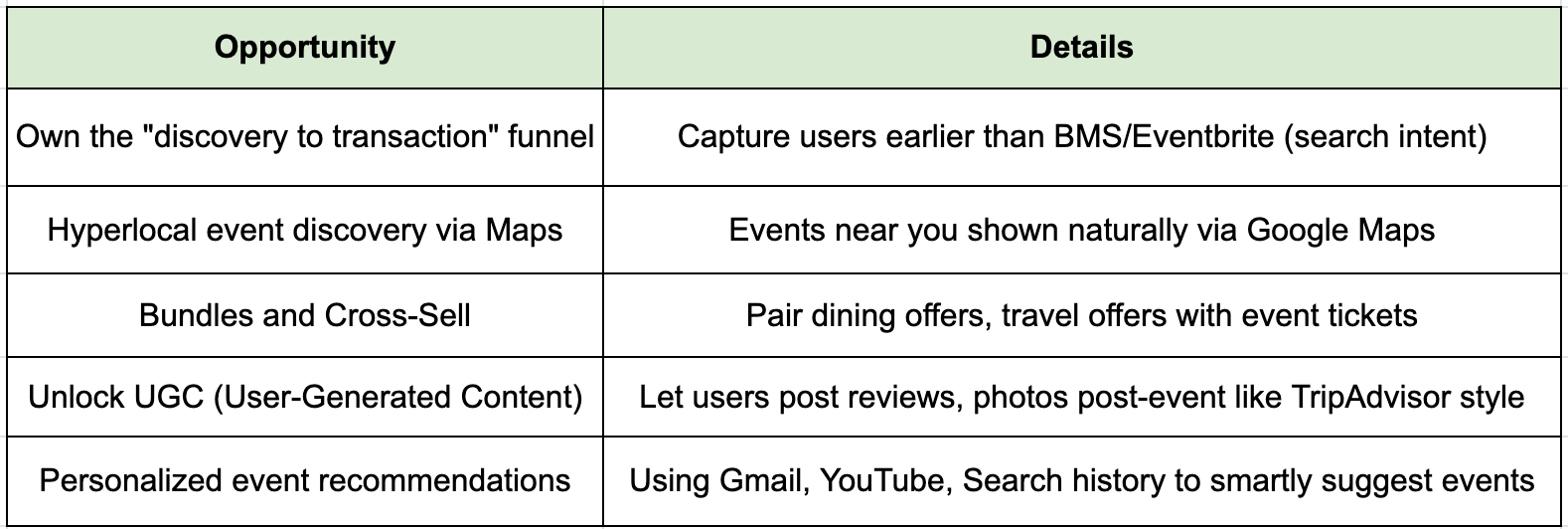Should Google get into the Ticketing Market?
Part 1 - Product Strategy Interview Question : Should Google get into the ticketing market? Part 2 - If so, then what would you build.
This is a two-part problem, so I’ll structure my response accordingly:
First, I’ll evaluate whether Google should enter the ticketing market based on strategic alignment, market opportunity, user needs, and competitive dynamics. (Part 1)
Then, assuming a "yes," I’ll outline what product Google should build, including the target users, value proposition, MVP features, monetization strategy, success metrics, and potential risks. (Part 2)
To guide this, I’ll use a structured product strategy framework covering:
Clarifying Questions
Current State: What Google Already Does
Market Analysis
Market Size (TAM, SAM, SOM)
Key Segments & Trends
User Behavior Insights
Competitor Landscape
India – Domestic Competitors
Global – International Competitors
Emerging Trends Among Competitors
Strengths vs Weaknesses Comparison
Google’s Position
Barriers to Entry for Google
Key Opportunities for Google
Google’s Unique Advantages
Effort and Risks:
Effort Required to Enter
Cost of NOT Entering
Risks / Downsides of Entering
Strategic Fit
Recommendation
Risks Mitigation Plan
Summary
1. Clarifying Questions
Before diving into the analysis, I’d like to ask few clarifying questions to better frame the problem:
Q1) Are we focusing on ticketing for live events (concerts, plays, sports), movies, tourist attractions (museums, exhibits), or also including travel ticketing (airlines, buses, public transport)?
Interviewer: For the scope of this question, focus only on live events, movies, and tourist attractions. Exclude travel ticketing like airlines or public transport.
Q2) Geographic Focus: Should I think about launching this globally, prioritize certain markets (like US, Europe, India), or focus only on North America?
Interviewer: Think globally, but tailor the strategy to local nuances where needed.
Q3) Are we expected to build a full end-to-end transactional system (discovery → booking → payment) or just improve the discovery layer (information aggregation)?
Interviewer: Prioritize end-to-end experience—discovery, availability, booking, and payment should all happen within Google's ecosystem.
Q4) Should I assume we will build direct partnerships with event organizers/venues, or primarily aggregate through third-party ticketing platforms?
Interviewer: Assume a mix—Google will build direct partnerships with major venues and self-serve onboarding for smaller organizers.
Q5) Is the goal to charge a booking fee, take a revenue share from event organizers, or purely drive ad revenue growth through better search engagement?
Interviewer: Assume a transaction-based revenue model (booking fees, revenue share), but design it to complement Google's existing ad-driven ecosystem.
Q6) Should I prioritize the experience on Search, Maps, or YouTube—or design a unified flow across all touchpoints?
Interviewer: Its upto you to decide.
Q7) Should the initial rollout target specific user demographics, like urban, younger, smartphone-savvy users, or design for general public usage?
Interviewer: Its upto you to decide.
Q8) Should I assume that existing ticketing aggregators (Bookmyshow, Ticketmaster, Stubhub, Fandango) will react aggressively, possibly pulling back ad spend or suing over anti-competitive behavior?
Interviewer: Be aware of competitive backlash, but assume Google is willing to manage short-term friction for long-term strategic gains.
Q9) Are there additional privacy, regulatory, or anti-trust considerations beyond Google's standard best practices (GDPR, CCPA)?
Interviewer: Follow standard privacy best practices. Be especially mindful of anti-trust optics when vertically integrating into the ticketing market.
Q10) Should we optimize primarily for ticket revenue, user engagement, increase in Search/Maps/YouTube usage, or a combination?
Interviewer: Aim for a combination of sustainable revenue growth and improved user engagement across Google services.
Q11) What is Google’s entry strategy — build, partner, or acquire?
Interviewer: It upto you to decide.
2. Current State: What Does Google Already Do?
When users search for movies, events, or attractions ("movies near me," "concerts in Mumbai," "Broadway shows NYC"), Google Search shows:
Basic event metadata / movie details (timing, venue, address)
Reviews, snippets of price ranges
Navigation through Google Maps
However, for actual booking, users are redirected to third-party platforms globally. Competitors,
India: BookMyShow (movies, live shows), Paytm Insider (live events, sports, experiences), PVR Cinemas
USA: Fandango (movies, cinema chains), Ticketmaster (concerts, sports), Eventbrite (community events, conferences)
There is no native flow where a user checks real-time seat availability, selects seats, buys the tickets, and stores a ticket without leaving Google.
Even for promotions, thrid party platforms heavily rely on Google/Youtube and Google is dependent on third party platform for listing and inventory.
However, there is no direct "buy ticket" inside Google yet.
Example:
Searching "Shah Rukh Khan movie tickets Mumbai" → Google shows theaters and showtimes → redirects to BookMyShow.
Searching "Taylor Swift concert tickets Los Angeles" → redirects to Ticketmaster.
3. Market Analysis: Ticket Booking & Event Discovery
Market Size (TAM, SAM, SOM):
India Market Breakdown:
🎯 Total Addressable Market (TAM)
Definition: The complete revenue potential from all ticketed live events, movies, and tourist attractions in India.
Estimate: Approximately $1.7 billion by 2026.
🎯 Serviceable Available Market (SAM)
Definition: The segment of the TAM that is accessible through online platforms, focusing on urban and semi-urban consumers.
Estimate: Around $1.2 billion.
Rationale: Onmanorama: Kerala News & Videos, Business Standard
🎯 Serviceable Obtainable Market (SOM)
Definition: The portion of the SAM that a new entrant, such as Google, could realistically capture in the short to medium term.
Estimate: Approximately $120–180 million (10–15% of SAM).
Rationale: Reanin, Fundamental Insights Consulting, Verified Market Research
Global Market Snapshot
🎯 Total Addressable Market (TAM)
Estimate: The global ticketing market was valued at $419.7 billion in 2024, projected to reach $1.4 trillion by 2031, growing at a CAGR of 19.2%. Reanin
🎯 Online Event Ticketing Market
Estimate: Valued at $60.1 billion in 2024, expected to grow to $111.4 billion by 2033, with a CAGR of 7.1%. Custom Market Insight
Key Segments & Trends:
User Behavior Insights
Users often search broadly first ("things to do this weekend") instead of searching specific events → Google is strong here.
In India, ~90% ticket bookings happen via mobile. Globally mobile bookings are 70%+ now.
India: Very price-sensitive; discounts, wallet offers matter a lot.
USA/Europe: More willing to pay premium for premium seats, VIP experiences.Reviews, ratings, "trending now" influence event choice heavily.
BookMyShow in India shows "how many people booked" — similar nudges could help Google.












